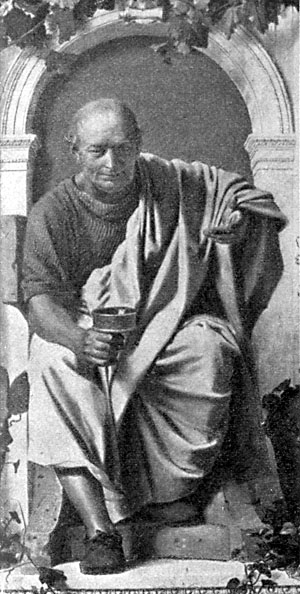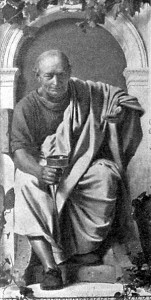Quintus Horatius Flaccus (Horace) – Ode 3, 29
The entire poem is outstanding as is reproduced in full below, but here is a highlight (Dryden version):
“Happy he, Self-centred, who each night can say
My life is lived: the morn may see
A clouded or a sunny day:
That rests with Jove: but what is gone,
He will not, cannot turn to nought;
Nor cancel, as a thing undone,
What once the flying hour has brought.”
From Perseus
06/12/15 – I now see Peter St. Andre has done a version. Here’s a key part and the full translation is at this link:
Joyous and self-possessed is the life of he
Who each day can say: “I have lived — tomorrow
The Father may fill the sky with black storm-clouds
Or purest sunshine,
Yet even so he can’t upset what is past:
He can’t complete or alter or make undone
Whatever the fleeting hour has once produced.”
For haughty Fortune,
Note: I generally don’t like to post “imagined” pictures of ancient figures, but I’ll make an exception for this one (from wikipedia). I like the look on the face here – friendly yet with dignity.
_________________________________________________________
Heir of Tyrrhenian kings, for you
A mellow cask, unbroach’d as yet,
Maecenas mine, and roses new,
And fresh-drawn oil your locks to wet,
Are waiting here. Delay not still,
Nor gaze on Tibur, never dried,
And sloping Aesule, and the hill
Of Telegon the parricide.
O leave that pomp that can but tire,
Those piles, among the clouds at home;
Cease for a moment to admire
The smoke, the wealth, the noise of Rome!
In change e’en luxury finds a zest:
The poor man’s supper, neat, but spare,
With no gay couch to seat the guest,
Has smooth’d the rugged brow of care.
Now glows the Ethiop maiden’s sire;
Now Procyon rages all ablaze;
The Lion maddens in his ire,
As suns bring back the sultry days:
The shepherd with his weary sheep
Seeks out the streamlet and the trees,
Silvanus’ lair: the still banks sleep
Untroubled by the wandering breeze.
You ponder on imperial schemes,
And o’er the city’s danger brood:
Bactrian and Serian haunt your dreams,
And Tanais, toss’d by inward feud.
The issue of the time to be
Heaven wisely hides in blackest night,
And laughs, should man’s anxiety
Transgress the bounds of man’s short sight.
Control the present: all beside
Flows like a river seaward borne,
Now rolling on its placid tide,
Now whirling massy trunks uptorn,
And waveworn crags, and farms, and stock,
In chaos blent, while hill and wood
Reverberate to the enormous shock,
When savage rains the tranquil flood
Have stirr’d to madness. Happy he,
Self-centred, who each night can say,
“My life is lived: the morn may see
A clouded or a sunny day:
That rests with Jove: but what is gone,
He will not, cannot turn to nought;
Nor cancel, as a thing undone,
What once the flying hour has brought.”
Fortune, who loves her cruel game,
Still bent upon some heartless whim,
Shifts her caresses, fickle dame,
Now kind to me, and now to him:
She stays; ’tis well: but let her shake
Those wings, her presents I resign,
Cloak me in native worth, and take
Chaste Poverty undower’d for mine.
Though storms around my vessel rave,
I will not fall to craven prayers,
Nor bargain by my vows to save
My Cyprian and Sidonian wares,
Else added to the insatiate main.
Then through the wild Aegean roar
The breezes and the Brethren Twain
Shall waft my little boat ashore.
Horace. The Odes and Carmen Saeculare of Horace. John Conington. trans. London. George Bell and Sons. 1882.


